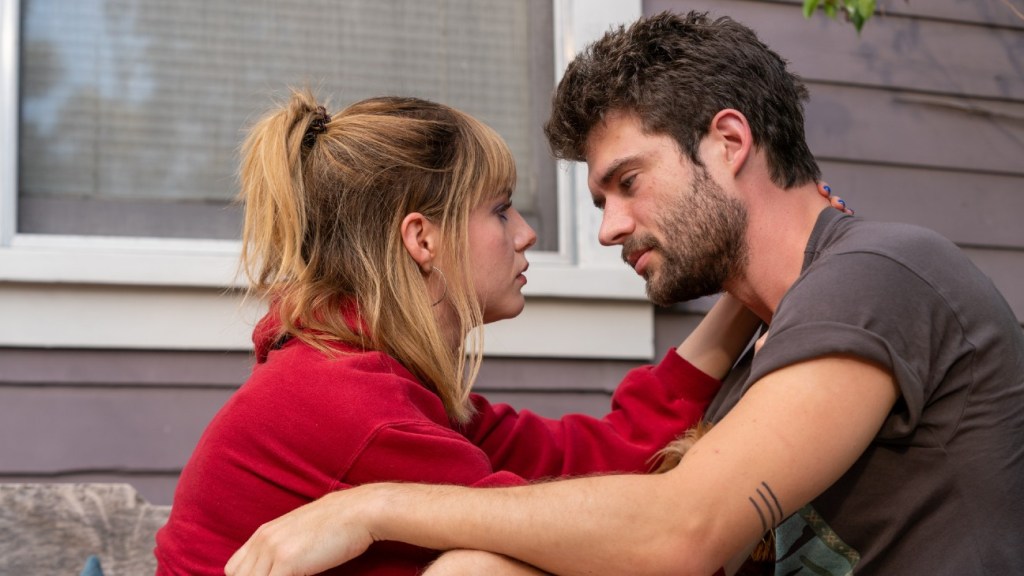
Lucy Boynton and David Corenswet's “The Greatest Hits”
Provided by Searchlight Pictures
A well-known subgenre of time-travel films involves characters traveling to the past to meet deceased loved ones. Writer and director Ned Benson puts a musical spin on that idea. Greatest Hits. Harriet (Lucy Boynton) was in the same car accident that killed her boyfriend Max (David Corenswet) two years earlier. Now, every time she hears a song they listened to together, she remembers the first time she experienced that music. Grief-stricken, she listens to her LPs labeled “tested” and “untested” every night, looking for a way back to the moment she can change to save Max's life. Or when her potential new love interest David (Justin H. Min) tells her, “So you're going to sit in this room and go back in time and play with her dead boyfriend.'' Please,” as I said.
Yes, she is, and it's an interesting premise. Benson deftly combines time travel, grief, and music. Mainly pop soundtracks from the past decade or so have included Needle She Drops, including Lana Del She Ray and Phoebe Bridgers. And while the chemistry is uneven, the actors are all solid enough.but greatest hits is the kind of movie that will sweep you away with its charm and emotion. Instead, it pushes too many obvious buttons to rise above the clichéd tropes of this tear-jerking drama.
greatest hits
conclusion
The concept is clever, but it lacks charm.
venue: SXSW Film Festival (Narrative Spotlight)
cast: Lucy Boynton, Justin H. Min, David Corenswet, Austin Klute, Retta
Director and screenwriter: ned benson
Rated PG-13, 1 hour 34 minutes
Boynton (bohemian rhapsody) makes modern Lucy believable and relatable. Although she aspired to be a record producer, she now works at a library where music cannot accidentally cause time jumps. When she indulges in her deliberate leaps into her past at night, we see how much she misses Max and why.Corren Sweat chosen to star in James Gunn's new film Superman, he is dashing and makes a perfect partner, at least as long as Harriet sadly remembers him. Boynton, always clean-cut, is less convincing here than Harriet, who is as bold as the script and her best friend Morris (Austin Klute) make her out to be.
In fact, Morris is her only friend. He knows her time travel secret and lovingly tells her that she has lived in her past for too long. Klute gives Morris some flair, and the fact that he works as a DJ shows how witty this movie is. His character is simply functional and appears to exist to allow more music to appear in the film.
Minutes (after yang) and Benson make some refreshing choices with the character of David. Unlike Max, he is quiet and hesitant, and when he describes Harriet's nightly routine to her, he does not put it unkindly. He's just trying to figure it out and her. They meet at a grief support group (led by Retta, who plays an understanding psychologist) who recently lost her parents. The visual clues to understanding his grief say more than the dialogue. He drives his parents' vintage convertible, and one of his liveliest scenes is with him and Harriet driving around in it singing Nelly Furtado's “I'm Like a Bird.” is. He was wearing a shirt with a VFW lodge number on the back, suggesting it may have belonged to his father. His character is delicately drawn and leaves us wanting to know more. Ming may charm movie viewers, but it doesn't help that there's no real spark between Harriet and David on screen, despite the movie leading us to believe there is. It won't.
Benson's previous features, The disappearance of Eleanor Rigby (2013) was actually three movies. he Told from the perspective of a grief-stricken husband (James McAvoy). she The same story is told from the perspective of the wife (Jessica Chastain). they Combine the two.like greatest hitsThere, Benson takes on an ambitious idea and directs it fluidly, but ultimately the actors trump the story.
he clearly put together greatest hits be careful. NC Page Buckner's production design is particularly impressive. When Harriet and David walk into the antique store they inherited from their parents, the smell of dust almost hits the air. Director Jung Hoon's cinematography uses dark tones that contrast with the bright Los Angeles sun that shines through much of the film. And eclectic pop music takes us on a lighthearted journey. Harriet and Max meet at an outdoor concert, and Jamie XX's Loud Places becomes the soundtrack to their love-at-first-sight moment. Harriet and David bond over a remix of their parents' favorite song, Roxy Music's “To Turn You On.”
But Harriet's trajectory is not surprising. What are the chances that in a movie like this, the heroine will be drowning in sadness and grief for the rest of her life? Near the end, there is a moment where Harriet's Boynton eyes fill with tears, and many viewers may have cried along with her. , it also feels like Benson is leading the viewer to follow his cues. This meticulously crafted film ultimately ends up being far too cautious and far less adventurous and triumphant than it was intended to be.


